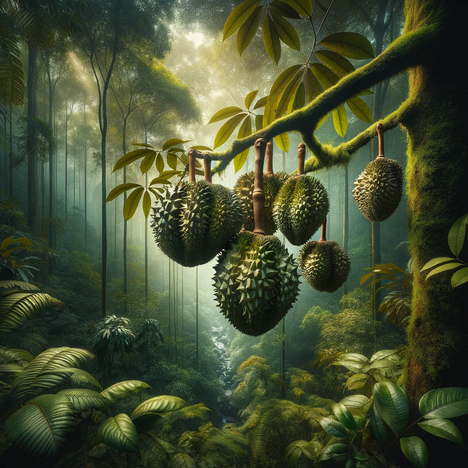Durian tree

The durian tree, famous for its spiky fruit with a distinctive aroma, is native to Southeast Asia and polarizes with its taste. While people in many cultures either love or shun this exotic fruit, the question is how safe it is for our four-legged friends. In this article, we delve into the world of the durian tree, examining its various components and their effects on dogs to gain a full understanding of whether or not it is toxic to dogs.
Components of the durian tree
The durian tree (Durio zibethinus) not only produces the infamous durian fruit; it consists of leaves, twigs, bark and, of course, the fruit itself, each of which has different properties and ingredients.
Durian fruit and dogs
Nutrient content
Durian fruit is rich in nutrients, including vitamins (C and B complex) and minerals (potassium, magnesium). These nutrients are beneficial for dogs in moderate amounts and can contribute to overall health.
Potential risks
Despite the nutritional content, caution is advised. Durian contains high levels of sugar and fat, which can lead to stomach upset, obesity and in some cases pancreatitis in dogs. In addition, the large, hard seed of the fruit is a choking hazard and can block the digestive tract if swallowed.
Leaves, bark and twigs
There is limited information on the toxicity of the leaves, bark and twigs of the durian tree to dogs. However, it is generally advisable to keep dogs away from plant parts that have not been clearly identified as safe, as unknown plant compounds may cause allergic reactions or toxicity.
Safety measures
If you wish to offer durian to your dog, it is important to do so in very limited quantities and ensure that there are no seeds or hard shells that could pose a choking risk.
While the durian tree and its fruit are not inherently toxic to dogs, it is crucial to exercise caution. The durian fruit may be safe in small amounts and without seeds as an occasional treat, but its high sugar and fat content can cause health problems. Other parts of the durian tree should be avoided as there is not enough information on their safety for dogs. Always remember, if you are unsure whether a food or plant is safe for your dog, it is best to err on the side of caution and avoid it or consult a veterinarian first. The health and welfare of your dog always comes first.
If you notice any signs of hypersensitivity or poisoning in your dog, you should see your vet immediately. We are not a substitute for a vet, but we try to be as accurate as possible. Every dog reacts differently and we recommend you get a second opinion or consult your vet if in doubt.
Stay healthy and take good care of your four-legged friend!😊
Similar to Durian tree
The papaya tree is a symbol of tropical sweetness and is often praised for its culinary and medicinal properties. While humans have been enjoying the benefits of this plant for centuries, the question...
The jackfruit tree(Artocarpus heterophyllus) is originally from India and belongs to the mulberry family. It is characterized by its enormous fruit, which is the largest tree-bearing fruit in the...
The lychee tree (Litchi chinensis) belongs to the Sapindaceae family and is native to the tropical and subtropical regions of Asia. The tree is best known for its lychee fruit, which has a hard,...
The mango, known for its sweet taste and juicy texture, is a popular fruit with many people around the world. But what about our four-legged friends? Before we dive into the specific components of...



